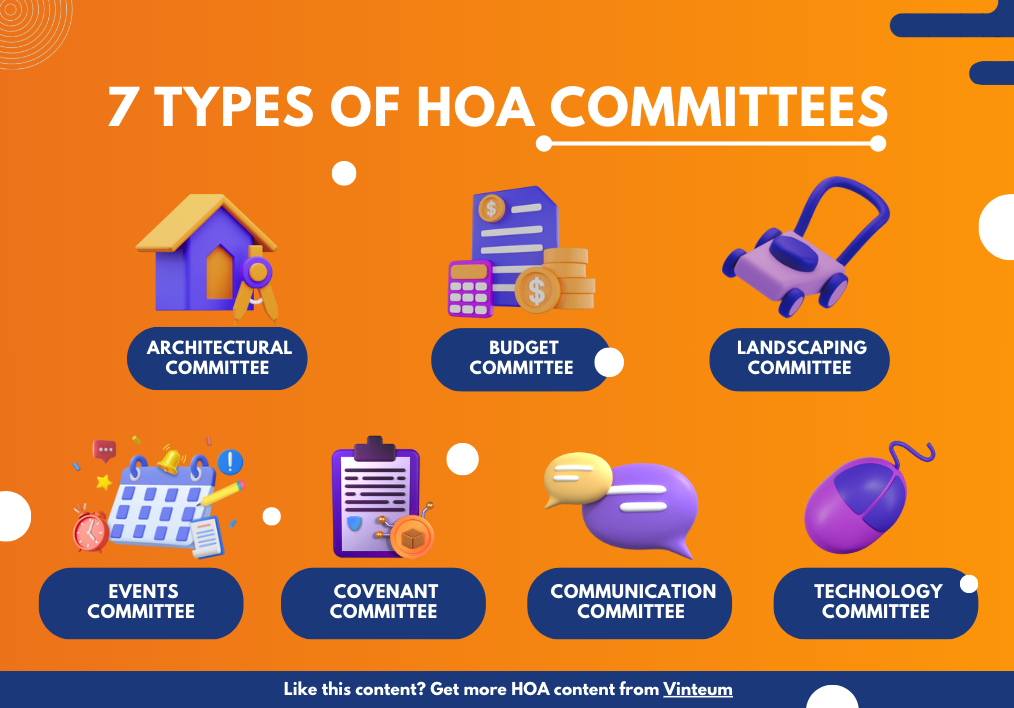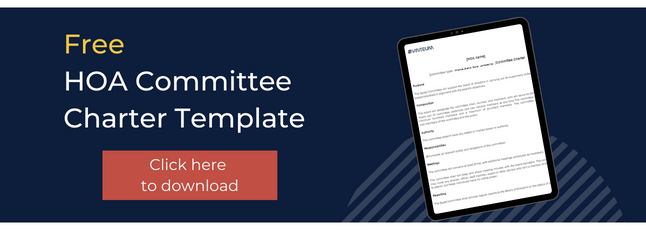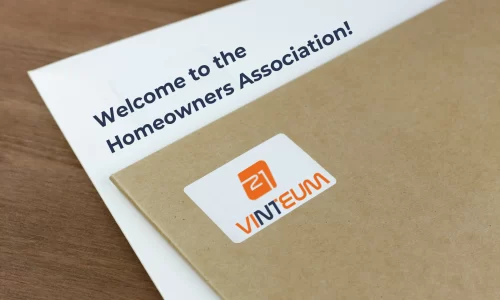HOA committees are an integral part of any association. They help relieve many burdens and issues from board members and help make sure the community is organized and a safe space for all residents.
Many people, however, don’t know the importance and even what an HOA committee is. This is why, in this article, we will go over the functions, benefits, and how to create a committee in your HOA!
What is an HOA committee?
An HOA committee can be described as several branches of community concerns that an HOA board has to deal with. For example architectural guidelines, landscaping, finances, etc. So apart from the main board, they have these groups that are composed of homeowner volunteers to take care of these issues.
Each association will have their own committees they think are necessary for their community. Here are some common committees that you will see in HOAs:

HOA architectural committee
An important aspect of HOAs is that they keep houses with a certain aesthetic as it helps maintain property values high. Due to this, they will impose certain guidelines of what you can or can not do to your house that will be established by the architectural committee.
Budget committee
The budget committee is primarily responsible for taking care of the finances of an HOA. This means they decide and take care of monetary investments, check expenses, manage audits, and any other financial concerns or projects that an HOA might have.
Landscaping committee
As the name suggests, this committee is responsible for the landscaping of an HOA – this can include trees, gardens, and flowers. Members are expected to maintain a beautiful outdoor look in their community, it helps to keep the values of the homes high. They will seek landscaping companies in order to help them with the work and keep the board updated on any changes/progress.
Events committee
One of the main benefits and goals of any HOA should be to bring the community together. A great way to do this is by creating events for residents to participate in and interact with each other. This committee will come up with event ideas like cookouts, Easter activities, Halloween trick-or-treat, garage sales, etc.
Covenant committee
Every HOA has rules and regulations which is why this committee exists. It is responsible for implementing and enforcing these rules and monitors those who do not follow the community’s regulations.
Communication committee
This committee is responsible for making sure that residents are updated and aware of any news/changes going on in their HOA. Some create HOA newsletters while others, as we are in a more digital environment, have social media in order to post announcements.
Technology committee
As mentioned previously, we are in a more digital age. This means that new committees need to be formed in order to help to keep up with this new technological era. The Technology committee is an example of this. Its main responsibility is to update and advise the board on any issues regarding data services, cellular usage, technology investment/strategy, software development projects, or any other technological concerns that would impact the community.
Committees have some limitations, including that the board needs to approve whatever decision/suggestion this committee makes. The Architectural committee being the exception, as it is granted special authority.
With that being said HOA committees are extremely important and beneficial to any HOA. Below you will find many of its advantages:
Advantages of HOA committees
- Residents’ perspective: Since homeowners are the ones that take part in committees, the board will have a wide range of residents’ views on things and be able to know what the community wants.
- Relieves board’s burden: The board has many responsibilities because taking care of an HOA is a lot of work. Because of this they can sometimes forget certain issues that are important but weren’t the priority at that moment. HOA committees make sure all issues and concerns are being addressed.
- Checks on the board: An HOA committee is responsible for reviewing facts, making recommendations and accessing solutions to make sure that all laws and regulations are being enforced fairly and responsibly.
How to create an HOA committee
- Governing documents: Your HOA’s governing documents might already have all of the information regarding rules and regulations of committees such as size limit, qualifications of board members, dismissal of board members, etc. It is very important that you check on these documents before anything.
- HOA Committee Charters: An HOA Committee Charter states:
- The purpose:why is this committee being formed?
- Product:what the committee will produce and/or what will be its actions?
- Timeframes: is it a permanent committee or a standing one? If it is temporary, how long will it stay active?
- Budget: How much investment is required for this committee?
- Roles:What are the roles required? For example: president, secretary, etc.
- Reporting: How will you update the board on what is happening? Through email, writing, in person?
- Structure: After all of this you should have a set structure of your committee. The main roles needed to appoint are the committee chair and secretary.
The committee chair eases the interaction between members, creates a meeting agenda, presides over meetings, establishes ground rules, and reports updates to the board. This is why it is important that the selected chairperson is great at communication and leadership skills.
Next is the secretary who is responsible for noting everything that has been said and agreed on in the meeting. They should also inform the community on any actions the committee is making.
- Finding Homeowners: With all of these things decided, it is time to recruit homeowners to be part of the committee. It’s important to have diverse skills in the committee. For instance, the budget committee will highly benefit from a volunteer with financial knowledge. Contact potential members and follow up and make sure you are clearly communicating what the community’s needs are.
- Closed meetings vs Open meetings: Finally, decide when your committee will have open or closed meetings. Open meetings are when all members can attend (residents, board members, community management experts). They show transparency about important HOA decisions before implementing them. Annual budgets, rule changes, property changes, and landscaping reports are all things that can be discussed in these meetings. Closed HOA meetings are attended only by committee members and selected homeowners. Typically, these meetings will discuss legal matters/advice, information about members, violations, as well as complaints.
Final Points
As you can see, HOA committees are imperative for an association to work smoothly and more efficiently. There are various committees you can implement in your community depending on what needs to be focused on. It will be especially beneficial for big committees that have various issues to deal with. It will surely ensure more organization in your board as well being for all residents!

Frequently Asked Questions (FAQs)
What is an HOA committee?
An HOA committee is a group of homeowners who volunteer to oversee specific areas or tasks within a homeowners’ association (HOA). They are responsible for carrying out various functions and making decisions related to the assigned area of responsibility.
What are the common types of HOA committees?
The types of HOA committees can vary depending on the specific needs of the community, but some common examples include architectural review committees, landscaping committees, social committees, finance committees, and maintenance committees.
How are committee members selected?
The process for selecting committee members may vary depending on the HOA’s governing documents and policies. Typically, homeowners interested in serving on a committee express their interest to the HOA board of directors, who then evaluates the candidates and makes appointments. Some HOAs may also allow homeowners to self-nominate or hold elections to select committee members.
Are committee positions paid positions?
In most cases, HOA committee positions are voluntary and unpaid. Homeowners volunteer their time and expertise to serve on committees for the benefit of the community. However, some larger or more complex HOAs may offer compensation or incentives for certain committee roles, but this is not the norm.
What are the responsibilities of an HOA committee?
The responsibilities of an HOA committee vary depending on their designated area of focus. Some common responsibilities include reviewing architectural plans and proposals, organizing social events, maintaining common areas, managing finances, and enforcing HOA rules and regulations related to the committee’s area of responsibility.
How long is the term for committee members?
The term length for committee members can vary depending on the HOA’s bylaws or policies. In some cases, committee members serve for a specific period, such as one or two years, while in others, there may not be a fixed term limit, and members can continue serving until they choose to step down or are replaced.
Can any homeowner join an HOA committee?
Generally, any homeowner within the HOA is eligible to join a committee. However, specific requirements or qualifications may be outlined in the HOA’s governing documents or committee guidelines. It is advisable to review these documents or check with the HOA board to understand any restrictions or prerequisites for committee participation.
Can committee decisions override the HOA board’s decisions?
The authority and decision-making power of an HOA committee are typically delegated to them by the HOA board. While committees have the responsibility to make recommendations and carry out tasks within their assigned area, their decisions are subject to the final approval of the HOA board. The board retains the ultimate authority and can override committee decisions if necessary.







One Response
Great article. I suggest that the term “HOA” in Florida only refers to Chapter 720. The others are Chapters 718, 719, 721 and 723. Committees may also be formed under corporate Chapters 607 and 617 (such as the “Board of Governers” of a country club, which may be served by, and serve, several local association Boards, thereby committees). An Association’s ad hoc “hearing” committee (formed by the Board) has the state’s authority to over-rule the Board regarding its intent to impose “a fine or suspension.” My opinion is that no committee of a Board should include a Director as a voting member (a non-voting liaison is acceptable) on its Roster, and that the optics of committees which do include directors, such as an Executive Committee, should not be sanctioned – 2 bites of the apple.